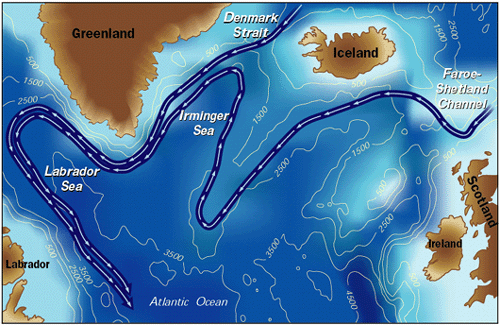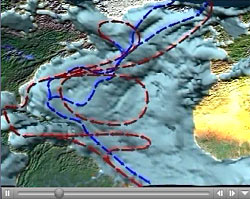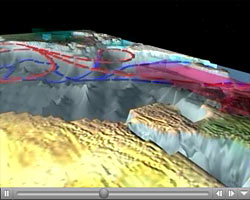
DRAMATIC CHANGES IN THE NORTH ATLANTICSubpolar seas bordering the North Atlantic have become noticeably less salty since the mid-1960s, especially in the last decade. This is the largest and most dramatic oceanic change ever measured in the era of modern instruments. This has resulted in a freshening of the deep ocean in the North Atlantic, which in the past disrupted the Ocean Conveyor and caused abrupt climate changes. (B. Dickson, et. al., in Nature, April 2002)

The Ocean Conveyor
The Ocean Conveyor is propelled by the sinking of cold, salty (and therefore denser) waters in the North Atlantic Ocean (blue lines). That creates a void that pulls warm, slaty surface waters northward (red lines). The ocean gives up its heat to the atmosphere above the North Atlantic Ocean, and prevailing winds (large red arrows) carry the heat eastward to warm Europe

If Too Much Fresh Water Enters the North Atlantic
If too much fresh water enters the North Atlantic, its waters could stop sinking. The Conveyor would cease. Heat-bearing Gulf Stream waters (red lines) would no longer flow into the North Atlantic, and European and North American winters would become more severe.
"Most of the studies and debates on potential climate change, along with its ecological and economic impacts, have focused on the ongoing buildup of industrial greenhouse gases in the atmosphere and a gradual increase in global temperatures. This line of thinking, however, fails to consider another potentially disruptive climate scenario. It ignores recent and rapidly advancing evidence that Earths climate repeatedly has shifted abruptly and dramatically in the past, and is capable of doing so in the future.
Fossil evidence clearly demonstrates that Earthvs climate can shift gears within a decade, establishing new and different patterns that can persist for decades to centuries. In addition, these climate shifts do not necessarily have universal, global effects. They can generate a counterintuitive scenario: Even as the earth as a whole continues to warm gradually, large regions may experience a precipitous and disruptive shift into colder climates.
This new paradigm of abrupt climate change has been well established over the last decade by research of ocean, earth and atmosphere scientists at many institutions worldwide. But the concept remains little known and scarcely appreciated in the wider community of scientists, economists, policy makers, and world political and business leaders. Thus, world leaders may be planning for climate scenarios of global warming that are opposite to what might actually occur.1
It is important to clarify that we are not contemplating a situation of either abrupt cooling or global warming. Rather, abrupt regional cooling and gradual global warming can unfold simultaneously. Indeed, greenhouse warming is a destabilizing factor that makes abrupt climate change more probable. A 2002 report by the US National Academy of Sciences (NAS) said, available evidence suggests that abrupt climate changes are not only possible but likely in the future, potentially with large impacts on ecosystems and societies.2
The timing of any abrupt regional cooling in the future also has critical policy implications. An abrupt cooling that happens within the next two decades would produce different climate effects than one that occurs after another century of continuing greenhouse warming.
snip
Are worrisome signals developing in the ocean?
If the climate systems Achilles heel is the Conveyor, the Conveyors Achilles heel is the North Atlantic. An influx of fresh water into the North Atlantics surface could create a lid of more buoyant fresh water, lying atop denser, saltier water. This fresh water would effectively cap and insulate the surface of the North Atlantic, curtailing the oceans transfer of heat to the atmosphere.
An influx of fresh water would also dilute the North Atlantics salinity. At a critical but unknown threshold, when North Atlantic waters are no longer sufficiently salty and dense, they may stop sinking. An important force driving the Conveyor could quickly diminish, with climate impacts resulting within a decade.
In an important paper published in 2002 in Nature, oceanographers monitoring and analyzing conditions in the North Atlantic concluded that the North Atlantic has been freshening dramaticallycontinuously for the past 40 years but especially in the past decade.4 The new data show that since the mid-1960s, the subpolar seas feeding the North Atlantic have steadily and noticeably become less salty to depths of 1,000 to 4,000 meters. This is the largest and most dramatic oceanic change ever measured in the era of modern instruments.
At present the influx of fresher water has been distributed throughout the water column. But at some point, fresh water may begin to pile up at the surface of the North Atlantic. When that occurs, the Conveyor could slow down or cease operating.
Signs of a possible slowdown already exist. A 2001 report in Nature indicates that the flow of cold, dense water from the Norwegian and Greenland Seas into the North Atlantic has diminished by at least 20 percent since 1950.5....
snip
http://www.whoi.edu/page.do?cid=9986&pid=12455&tid=282